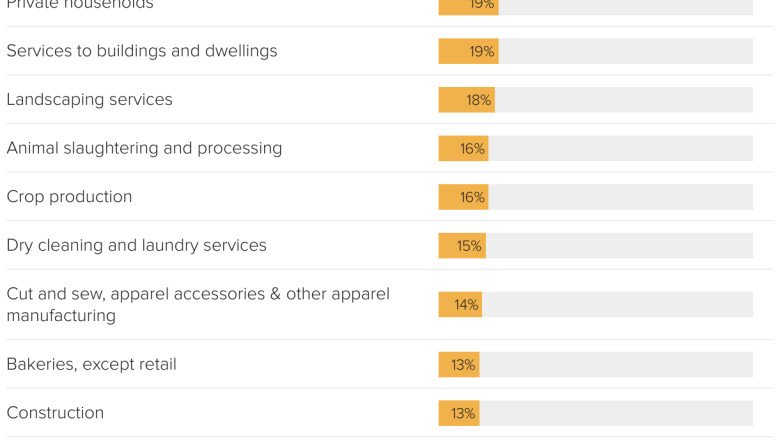
views
The Trump administration resumed more aggressive workplace immigration enforcement earlier this week after briefly pausing arrests at farms, hotels and restaurants last week.
“The message is clear now that we’re going to continue doing worksite enforcement operations, even on farms and hotels, but based on a prioritized basis,” President Trump’s “border czar,” Tom Homan, said Thursday, adding, “Criminals come first.”
The White House argues that undocumented workers drive down wages and take jobs from American-born workers. But some farming and hospitality industry leaders have warned the administration that large-scale deportations could disrupt operations, as many of these workers fill essential jobs that are difficult to replace with domestic labor.
Undocumented immigrants make up a sizable slice of the workforce in not only hospitality and farming but also construction and manufacturing.
Additionally, undocumented workers are spread across the U.S., including in blue states like California and New Jersey, and in states that supported Mr. Trump in the 2024 election, like Texas, Florida, and Nevada, which have some of the biggest shares of unauthorized workers.
Here’s a closer look at the industries most dependent on undocumented workers and the states where these workers are concentrated.
The Center for Immigration Studies estimated in 2024 that there are about 14 million undocumented immigrants living in the U.S.
The most recent detailed breakdown by sector and state comes from the Pew Research Center’s analysis of Census data from 2022. According to that study, there were an estimated 8.3 million undocumented immigrants who were part of the workforce, out of 11 million total in the country at that time.
These workers made up 4.8% of the overall U.S. workforce, according to Pew, but they were a much larger share of the workforce in several essential industries.
Nearly 1 in 5 household workers and landscapers, 16% of crop workers and meat processors, 14% of apparel manufacturing workers and 13% of construction workers were undocumented immigrants, Pew estimated.
The numbers were even higher depending on the occupation. One-third of roofers and workers who install drywall and ceiling tiles were undocumented, as were a quarter of maids and housekeepers, and nearly one-fifth of brickmasons.
Because the U.S. Census does not directly ask about legal status, the number of unauthorized immigrants and their participation in the workforce is inexact. Pew Research Center analyzed the American Community Survey from 2022, and Goldman Sachs produced similar estimates based on the 2023 version of the survey.
The share of undocumented workers in a given industry may be even higher than estimates based on the Census. A survey by the Department of Agriculture from 2021 to 2022 found that 42% of 2,600 crop workers interviewed did not have work authorization.
Industry leaders have said the renewed deportation push is making it harder to operate. American Farm Bureau Federation president Zippy Duvall expressed disappointment on Tuesday in the administration’s decision to restart immigration arrests on farms, forecasting that it could lead to inflated food prices for American consumers.
“Unfortunately, domestic workers do not apply for farm jobs, despite aggressive hiring efforts. Without farm workers, vegetables will be left in the fields, fruit will remain unpicked, and cows will go unmilked. The end result is a reduced food supply and higher grocery prices for all of America’s families,” Duvall said in a statement.
Research also indicates that deportation can actually lead to fewer jobs for native-born workers. One study of the Obama administration’s Secure Communities program, which deported nearly half a million undocumented immigrants, estimated that for every 1 million people deported, the number of jobs held by U.S.-born people would be reduced by 88,000.
“You can think about foreign-born workers taking jobs like a construction worker or a dishwasher at a local restaurant, and then once people are in those jobs employers are also able to hire construction managers and waiters and waitresses. And those are jobs typically taken by U.S.-born workers,” economist Chloe East, the study’s author, told CBS News.
Researchers at the Peterson Institute for International Economics, a Washington, D.C.-based think tank, estimate that if all of the unauthorized workers in the country were deported, U.S. GDP could fall as much as 7.4% below baseline by 2028.
President Trump said in a recent post on social media that his administration would focus on deportation efforts in Democrat-led cities like Los Angeles, Chicago and New York, which he characterized as the places where “millions upon millions of illegal aliens reside.”
But research indicates the undocumented population is spread across the country in both blue- and red-leaning states.
Unauthorized immigrants make up the greatest share of both the population and workforce in Nevada and Texas — two states Mr. Trump won in 2024 — where the Pew Research Center estimates over 8% of workers were undocumented as of 2022.
In California, where immigration enforcement raids sparked protests last week, Pew estimated that as of 2022, 7.2% of the workforce was undocumented. In New York, the figure was about 5%.
Texas Restaurant Association CEO and president Emily Williams Knight told CBS News that some restaurants in the state are experiencing staffing issues because workers are afraid to come to work amid the crackdown.
“You have to remember, if people stop going to work in restaurants, that means restaurants can’t serve their community. That means the dollar that restaurants put into each community, for a dollar spent, goes away, and then those workers are also not spending,” Knight said.
White House spokeswoman Abigail Jackson said, “While the President remains focused on immediately removing dangerous criminal illegal aliens from the country, including those given safe harbor in Democrat-run sanctuary cities, anyone who is here illegally is liable to be deported.”
Jackson added, “Any suggestion that enforcing immigration law will hurt the workforce misses the forest for the trees — there is no shortage of American minds and hands to grow our labor force.”
Laura Doan is a fact checker for CBS News Confirmed. She covers misinformation, AI and social media.
https://wol.com/trumps-deportation-efforts-could-impact-these-industries-and-states-that-rely-on-undocumented-workers/























Comments
0 comment